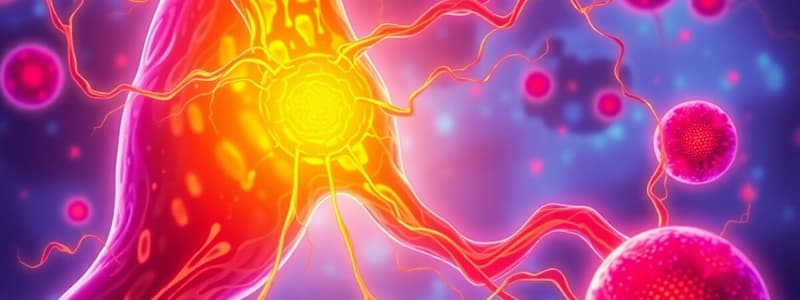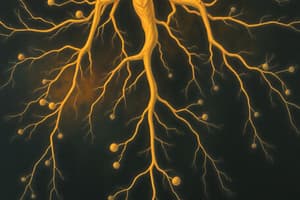Podcast
Questions and Answers
What is the primary role of lymph nodes in the lymphatic system?
What is the primary role of lymph nodes in the lymphatic system?
- They store nutrients for the body.
- They produce red blood cells.
- They regulate blood pressure.
- They filter harmful substances and produce lymphocytes. (correct)
What is the function of the thymus in the immune system?
What is the function of the thymus in the immune system?
- It filters the blood of toxins.
- It produces red blood cells.
- It matures T cells and produces lymphocytes. (correct)
- It acts as a reserve for unused blood.
Which statement accurately describes the spleen's function?
Which statement accurately describes the spleen's function?
- It is the only organ that produces B cells.
- It circulates lymph throughout the body.
- It filters blood and disposes of worn-out red blood cells. (correct)
- It produces hormones for blood regulation.
What is the composition of lymph formed in the digestive system, known as chyle?
What is the composition of lymph formed in the digestive system, known as chyle?
Where are lymph nodes majorly concentrated in the body?
Where are lymph nodes majorly concentrated in the body?
Which function is NOT performed by lymphatic vessels?
Which function is NOT performed by lymphatic vessels?
What is the ultimate source of all blood cells, including immune cells?
What is the ultimate source of all blood cells, including immune cells?
What cells are known for fighting infection in the lymphatic system?
What cells are known for fighting infection in the lymphatic system?
What happens to the spleen with age and in the presence of infectious diseases?
What happens to the spleen with age and in the presence of infectious diseases?
Which type of cells are produced by the thymus?
Which type of cells are produced by the thymus?
What is the primary function of lymph nodes in the immune system?
What is the primary function of lymph nodes in the immune system?
Which organ is responsible for T cell maturation?
Which organ is responsible for T cell maturation?
What significant role does the spleen play in the immune system?
What significant role does the spleen play in the immune system?
Which type of lymphocyte is responsible for antibody production?
Which type of lymphocyte is responsible for antibody production?
Which part of the lymphatic system is responsible for collecting lymph from the lower body?
Which part of the lymphatic system is responsible for collecting lymph from the lower body?
What characterizes the composition of chyle?
What characterizes the composition of chyle?
What is the primary function of macrophages within lymph nodes?
What is the primary function of macrophages within lymph nodes?
Which statement best describes lymph?
Which statement best describes lymph?
Flashcards are hidden until you start studying
Study Notes
Hematologic/Lymphatic System
- Lymph nodes perform phagocytosis, destroying invading cells and foreign particles.
- The thoracic duct is the largest lymph vessel, collecting lymph from below the diaphragm and the left side above it.
- Accessory organs include the spleen, tonsils, and thymus, which all play crucial roles in immune function.
- The spleen can enlarge during infections and decreases in size with age; it performs some phagocytosis.
- Tonsils filter bacteria and other foreign matter from the throat area.
- The thymus is responsible for producing cells that target and destroy foreign substances.
- Bone marrow generates all blood cells, including white blood cells essential for the immune response.
Lymphatic System
- Lymph, a fluid in the lymphatic system, is formed from tissue fluids/blood plasma and contains high levels of lymphocytes.
- Chyle, a type of lymph formed in the digestive system, appears milky white due to higher fat content.
- Lymph vessels are structured with walls and valves to carry lymph throughout the body.
Lymph Nodes
- Small, bean-shaped glands that produce lymphocytes and filter harmful substances, containing macrophages that digest cellular debris and pathogens.
- Major lymph node groups are located in the tonsils, adenoids, armpits, neck, groin, and mediastinum.
Thymus
- Located between the breastbone and heart, the thymus produces lymphocytes and is crucial for the maturation of T cells, important for immune and endocrine functions.
Spleen
- Situated in the upper left abdomen, the spleen filters blood, removes old red blood cells, and maintains a reserve supply of blood, consisting of red and white lymphatic tissue.
Types of Immunity Cells
- White blood cells are found in the bloodstream and perform specific immune functions.
- B cells (B lymphocytes) produce antibodies that bind to and neutralize antigens; each B cell generates a specific antibody.
- T cells (T lymphocytes) eliminate infected cells; they include:
- Helper T cells, which signal B cells to produce antibodies and guide killer T cells' actions.
- Killer T cells, which destroy infected cells.
- Memory cells, which retain information about previously encountered antigens to expedite future immune responses.
Hematologic/Lymphatic System
- Lymph nodes perform phagocytosis, destroying invading cells and foreign particles.
- The thoracic duct is the largest lymph vessel, collecting lymph from below the diaphragm and the left side above it.
- Accessory organs include the spleen, tonsils, and thymus, which all play crucial roles in immune function.
- The spleen can enlarge during infections and decreases in size with age; it performs some phagocytosis.
- Tonsils filter bacteria and other foreign matter from the throat area.
- The thymus is responsible for producing cells that target and destroy foreign substances.
- Bone marrow generates all blood cells, including white blood cells essential for the immune response.
Lymphatic System
- Lymph, a fluid in the lymphatic system, is formed from tissue fluids/blood plasma and contains high levels of lymphocytes.
- Chyle, a type of lymph formed in the digestive system, appears milky white due to higher fat content.
- Lymph vessels are structured with walls and valves to carry lymph throughout the body.
Lymph Nodes
- Small, bean-shaped glands that produce lymphocytes and filter harmful substances, containing macrophages that digest cellular debris and pathogens.
- Major lymph node groups are located in the tonsils, adenoids, armpits, neck, groin, and mediastinum.
Thymus
- Located between the breastbone and heart, the thymus produces lymphocytes and is crucial for the maturation of T cells, important for immune and endocrine functions.
Spleen
- Situated in the upper left abdomen, the spleen filters blood, removes old red blood cells, and maintains a reserve supply of blood, consisting of red and white lymphatic tissue.
Types of Immunity Cells
- White blood cells are found in the bloodstream and perform specific immune functions.
- B cells (B lymphocytes) produce antibodies that bind to and neutralize antigens; each B cell generates a specific antibody.
- T cells (T lymphocytes) eliminate infected cells; they include:
- Helper T cells, which signal B cells to produce antibodies and guide killer T cells' actions.
- Killer T cells, which destroy infected cells.
- Memory cells, which retain information about previously encountered antigens to expedite future immune responses.
Studying That Suits You
Use AI to generate personalized quizzes and flashcards to suit your learning preferences.




